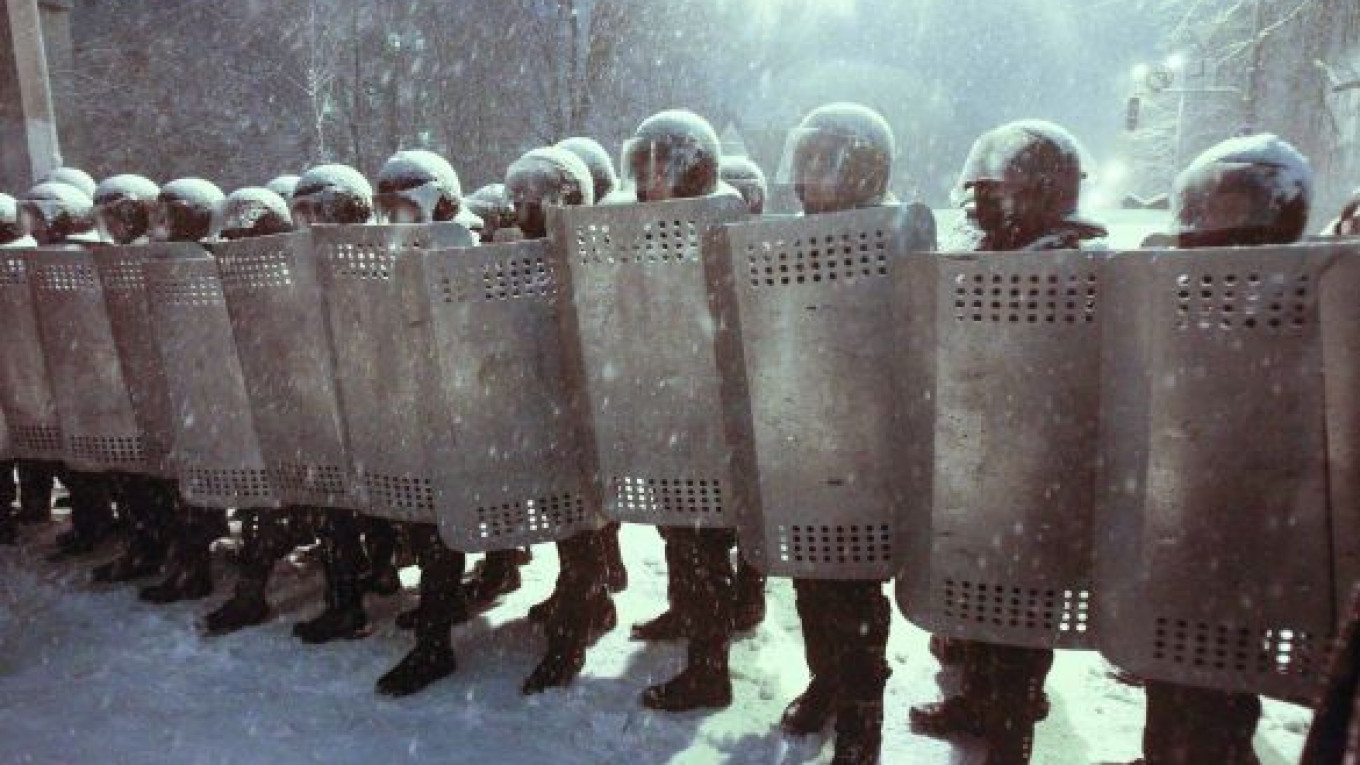Ukrainian police in full riot gear have encircled tents and barricades erected by anti-government protesters that are blocking city buildings in Kiev and have begun to dismantle them.
The police action involved at least two protest sites outside government buildings in the center of the Ukrainian capital and followed hundreds of police flooding into the center of Kiev on Monday as mass anti-government protests gripped the city for yet another week.
President Viktor Yanukovych has faced more than three weeks of protests after shelving a treaty with the European Union to focus on ties with Moscow. The protests were galvanized after police violently dispersed some of the demonstrators. Sunday's demonstration by hundreds of thousands was the largest since the 2004 pro-democracy Orange Revolution protests that annulled Yanukovych's presidential victory due to voting fraud.
In a surprise move, Yanukovych announced that he would sit down with three former Ukrainian presidents on Tuesday to discuss a way out of the crisis that has paralyzed the country. The EU's foreign policy chief, Catherine Ashton, was headed to Ukraine to help defuse the tensions.
The political standoff has been aggravated by Ukraine's deteriorating finances. The economy has been in recession for more than a year, and the government is in desperate need of foreign funding to avoid a default. As talks stalled with the International Monetary Fund, Yanukovych has sought a bailout loan from Russia.
Wearing helmets and holding shields, Ukrainian police took up positions outside Kiev's city hall on Monday, the deadline a court has set for the protesters who are occupying the building to leave. Police have also blocked the entrances to nearby Independence Square, known as the Maidan, which has been the heart of the protests.
At the square, black-robed Orthodox priests sang solemn prayers on Monday, calling for peace amid heavy snowfall. Some talked to the police.
Some protesters left the city building, fearing a violent police raid, but dozens of more radical activists barricaded themselves inside. They were armed with wood planks, metal rods and bottles of sunflower oil, hoping to make riot police slip if they advanced.
"We will not let anybody into the building," said Vasyl Khlopotaruk, one of the organizers. "But we hope there will not be bloodshed."
Opposition leader Arseniy Yatsenyuk called for calm, telling several thousand protesters on Independence Square that police were ordered not to storm the building but to blockade the protest camp to deplete it of food and other amenities.
"I am turning to all Ukrainians: You must all go to the heart of the Maidan," he said.
Some activists approached police lines, urging officers to come over to their side and even offering them food.
As tensions mounted, Yanukovych announced on his website that he would meet with Ukraine's three former presidents to discuss the situation. But at the same time, prosecutors called in several opposition leaders for questioning.
EU Commission President Jose Manuel Barroso dispatched EU foreign policy chief Ashton to Kiev on Tuesday, saying she would try to help defuse "the very tense solution that Ukraine is living today." Barroso praised the demonstrators, saying they were "writing the new narrative for Europe."
U.S. Ambassador to Ukraine Geoffrey Pyatt cautioned the government against using force.
"Peaceful demonstrations must be allowed to continue," he wrote on Twitter. "Dialogue and non-violence key, world watching. Opportunity must not be lost."
Political analyst Volodymyr Fesenko said Monday's deployment of troops to Kiev appeared to be a show of force, but that a crackdown was still possible.
"For now they are trying to scare Maidan and Kiev residents, but the risk of a forceful storming remains high," he said.
The protests that erupted on Nov. 21 have had an anti-Russian bent because Moscow worked hard to derail the Ukraine-EU deal, issuing threats of trade consequences if Ukraine went through with it.
On Sunday, hundreds of thousands of protesters calling for Yanukovych's ouster poured into Kiev, toppling a statue of former Soviet leader Vladimir Lenin and blockading government buildings in the escalating standoff over the future of the former Soviet republic of 46 million people.
As anger spread across the country, protesters on Monday vandalized another Lenin statue in the southern town of Kotovsk, removing the upper part of the cement monument.
"Only the legs are left standing," town spokeswoman Yelena Khaustova said.
A Message from The Moscow Times:
Dear readers,
We are facing unprecedented challenges. Russia's Prosecutor General's Office has designated The Moscow Times as an "undesirable" organization, criminalizing our work and putting our staff at risk of prosecution. This follows our earlier unjust labeling as a "foreign agent."
These actions are direct attempts to silence independent journalism in Russia. The authorities claim our work "discredits the decisions of the Russian leadership." We see things differently: we strive to provide accurate, unbiased reporting on Russia.
We, the journalists of The Moscow Times, refuse to be silenced. But to continue our work, we need your help.
Your support, no matter how small, makes a world of difference. If you can, please support us monthly starting from just $2. It's quick to set up, and every contribution makes a significant impact.
By supporting The Moscow Times, you're defending open, independent journalism in the face of repression. Thank you for standing with us.
Remind me later.


